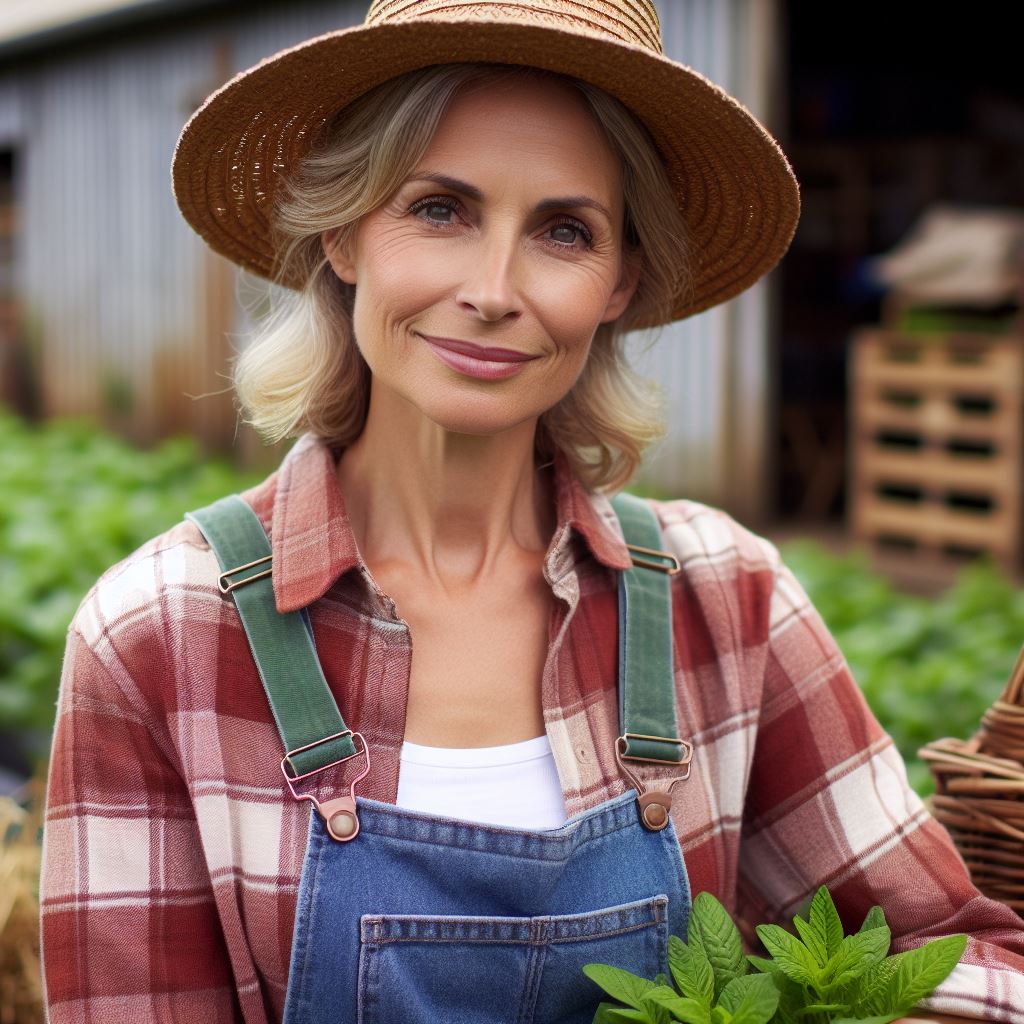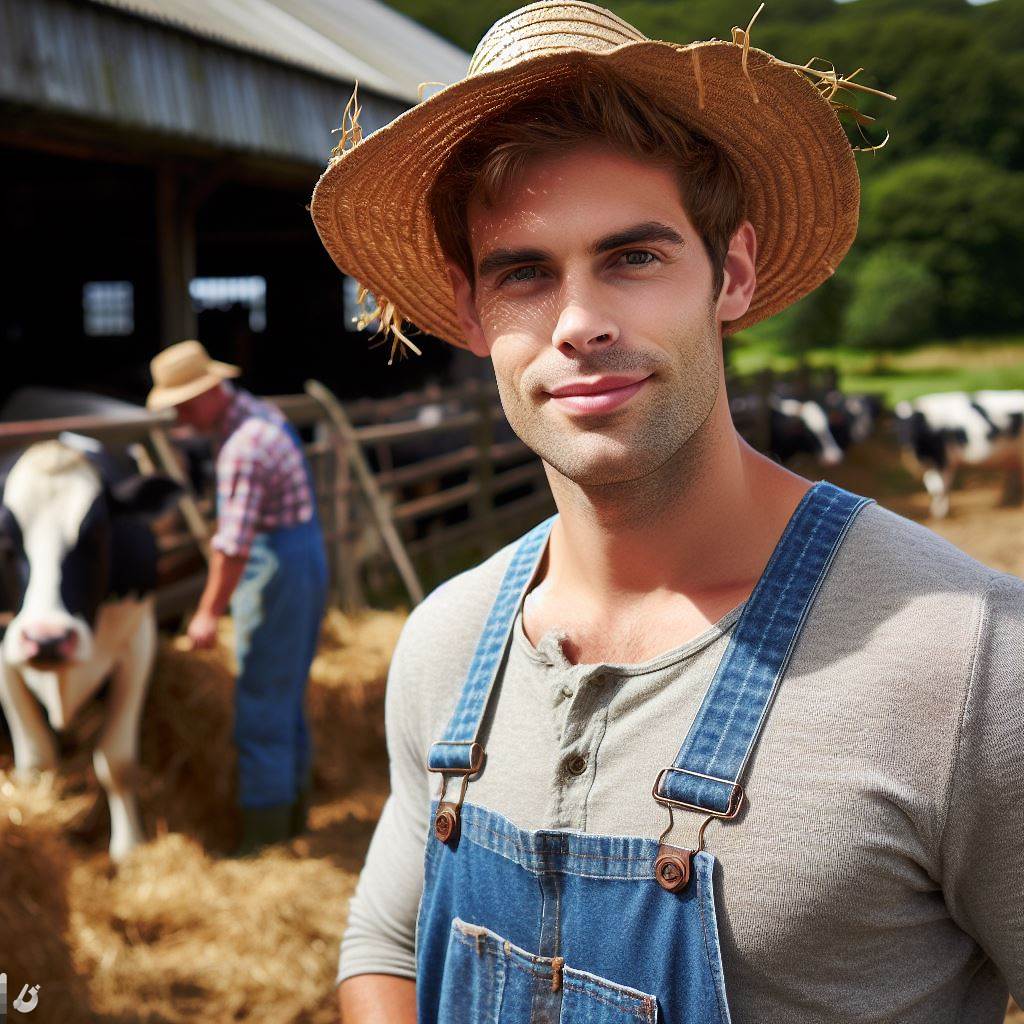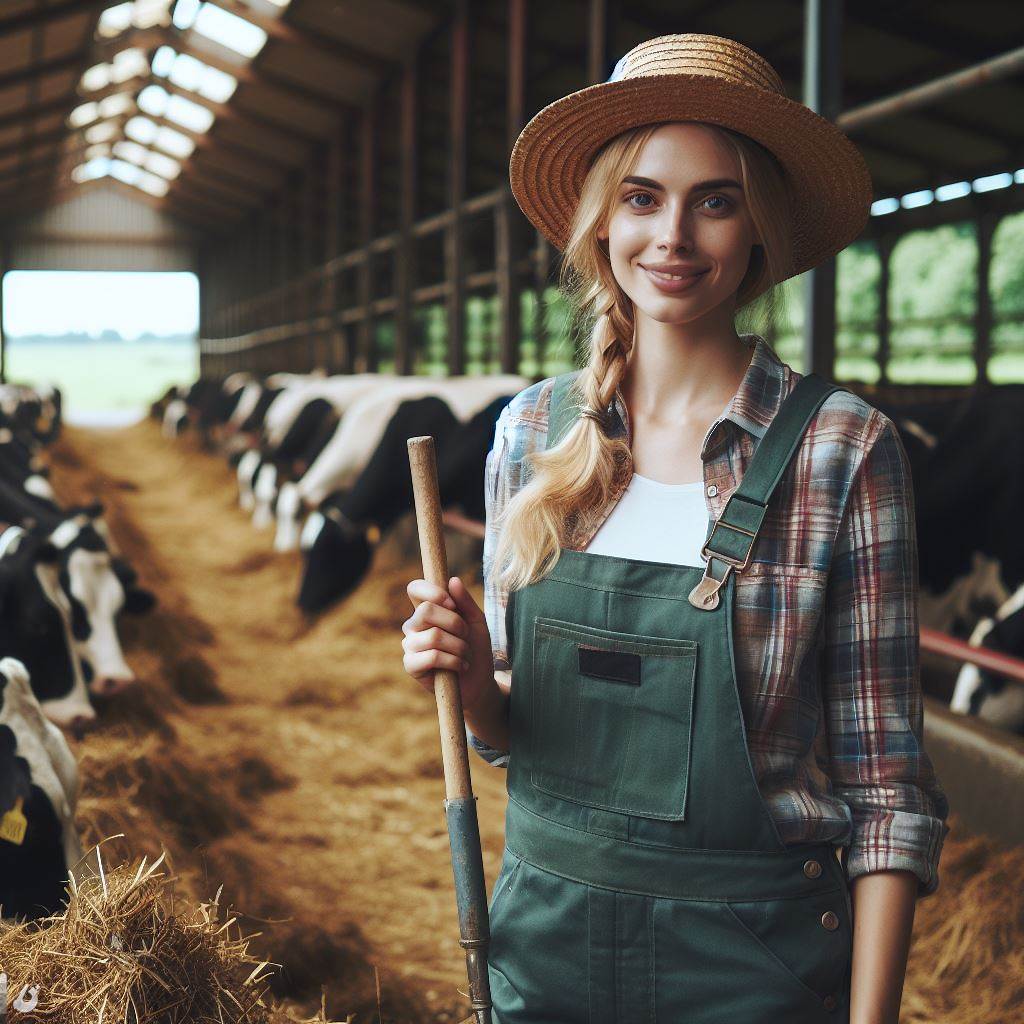Introduction
Heritage farming practices, also known as traditional farming methods, are techniques passed down through generations.
These practices have incredible significance in preserving cultural heritage and maintaining a connection to our agricultural past.
In this blog post, we will explore the importance of heritage farming practices in the UK and how they are being revived and embraced by farmers today.
We will discuss the benefits these practices offer, both for the environment and for our cultural heritage.
Additionally, we will highlight some specific examples of heritage farming methods that are making a comeback in the UK.
By the end of this post, you will have a deeper understanding of why heritage farming practices matter, and how they contribute to the preservation of our cultural heritage and the sustainability of our food systems.
Let’s delve into the world of heritage farming and discover the beauty and wisdom it holds.
History of Heritage Farming Practices in the UK
Heritage farming practices in the UK have a long and fascinating history that dates back centuries.
These practices, deeply rooted in the country’s agricultural heritage, have played a vital role in shaping the way farms operate and produce food.
Origins of Heritage Farming Practices in the UK
To truly understand the significance of heritage farming practices, we must first delve into their origins.
These practices can be traced back to the days when the agrarian way of life dominated the UK countryside.
During the medieval period, agriculture formed the backbone of the British economy. Farmers embraced traditional techniques such as crop rotation, grazing rotations, and careful land stewardship.
These practices were passed down through generations, providing a sustainable and harmonious relationship between humans and nature.
The Decline of Heritage Farming Practices
Despite their once-burgeoning popularity, heritage farming practices faced a decline over time. The introduction of modern agricultural methods brought widespread changes to the farming industry.
The industrial revolution of the 18th and 19th centuries marked a turning point for agriculture.
Personalized UK Career Consulting
Receive tailored career guidance designed just for you. Get actionable steps and expert support to boost your career in 1-3 days. Take control of your career now.
Get StartedFarmers began adopting new technologies, such as machinery and synthetic fertilizers, which promised increased productivity and efficiency.
As the UK embraced industrialization, the traditional farming methods that had been ingrained in its history started to diminish.
Large-scale farming became the norm, with a focus on monoculture and intensive farming practices to meet the growing demands of a rapidly expanding population.
The Revival of Heritage Farming Practices
In recent years, there has been a resurgence of interest in heritage farming practices, driven by a growing awareness of their benefits for both the environment and human health.
One of the main factors contributing to this revival is the recognition of the detrimental impact of modern agriculture on the environment.
Heritage farming practices promote biodiversity and sustainable land management, which are essential for preserving ecosystems and combating climate change.
Furthermore, there is a growing demand for locally sourced, organic produce.
Heritage farming practices align perfectly with these preferences, as they prioritize small-scale farming, traditional techniques, and a strong connection between farmers and consumers.
Organizations and initiatives dedicated to preserving and promoting heritage farming have emerged.
These include educational programs, farmers’ markets, and community-supported agriculture schemes, all of which help to revive and preserve traditional farming practices.
Another significant factor driving the revival is the growing interest in traditional and heritage breeds of livestock.
These breeds, once on the brink of extinction, are now being recognized for their superior taste and hardiness in the face of changing climates.
In essence, the history of heritage farming practices in the UK reflects a rich agricultural tradition that has weathered centuries of change.
From their origins in medieval practices to the decline during the industrial revolution, these methods are now experiencing a well-deserved revival.
Your Dream Job Starts with a Perfect CV
Get a tailored CV and cover letter that captures your unique strengths and stands out in your industry. Let us help you make an unforgettable first impression.
Get StartedThe UK’s promising future in heritage farming stems from environmental awareness, consumer demand for sustainability, and appreciation for heritage breeds.
As we move forward, it is crucial to continue celebrating and preserving these practices that are deeply intertwined with the country’s history and culture.
Factors Contributing to the Revival
Growing interest in organic and sustainable farming methods
The increased awareness about the harmful effects of chemical pesticides and fertilizers has led to a surge in organic farming practices.
Farmers are adopting sustainable methods to protect the environment and preserve the soil quality.
Role of consumer demand for locally sourced and traditional products
Consumers are becoming more conscious of the food they consume, seeking products that are locally sourced and authentic.
This demand creates a market for heritage farming, as it provides consumers with access to traditional and unique produce.
Agricultural societies, and government initiatives supporting heritage farming
Various organizations and agricultural societies are actively involved in promoting and preserving heritage farming practices.
They provide farmers with resources, training, and financial support to revive and continue these traditional methods.
Preservation of cultural heritage
Heritage farming plays a vital role in preserving cultural traditions and heritage. These farming practices have been passed down through generations, reflecting the history and identity of a region.
Reviving heritage farming helps in maintaining cultural diversity and promoting cultural tourism.
Environmental benefits
Heritage farming practices often focus on agroecology, which emphasizes the integration of agriculture and ecology.
By adopting sustainable farming techniques, heritage farmers contribute to biodiversity conservation, soil fertility improvement, and reduction of water pollution.
These practices promote long-term environmental sustainability.
Economic opportunities for farmers
Reviving heritage farming practices can provide economic opportunities for farmers.
Optimize Your LinkedIn for Success
Boost your LinkedIn profile with a professional bio, keyword-rich headline, and strategic recommendations that attract recruiters. Stand out from the crowd and get noticed.
Optimize NowBy cultivating unique and traditional crops, farmers can tap into niche markets and command higher prices for their produce. This can help increase their income and improve their livelihoods.
Health benefits of traditional and locally sourced products
Consuming traditional and locally sourced products has numerous health benefits.
Unlike mass-produced and processed foods, heritage products are often grown using organic methods, which increase their nutritional value.
These products are free from artificial additives and are healthier options for consumers.
Promotion of food security
Heritage farming practices contribute to food security by diversifying the range of crops grown.
By cultivating traditional varieties, farmers ensure the availability of different types of fruits, vegetables, and cereals.
This reduces the dependence on a limited range of commercial crops, enhancing food security in the long run.
Education and knowledge transfer
Reviving heritage farming practices helps in preserving traditional farming knowledge and skills.
Through training programs, workshops, and farmer-to-farmer knowledge transfer, younger generations can learn about traditional farming techniques.
This ensures the continuity of these practices for future generations.
Resistance to industrialized agriculture
The revival of heritage farming practices represents a resistance to industrialized agriculture and the negative impacts associated with it.
By choosing traditional and sustainable methods, farmers are challenging the dominance of industrial farming and promoting alternative approaches that prioritize environmental and community well-being.
In general, several factors contribute to the revival of heritage farming practices in the UK.
Organic and sustainable methods gain traction due to consumer demand for local, traditional products, supported by organizations, government initiatives, and environmental benefits.
Reviving heritage farming not only ensures the conservation of traditional farming knowledge but also provides economic opportunities, promotes food security, and fosters a healthier food system.
Read: Innovations in UK Farm Management Techniques
Popular Heritage Farming Practices in the UK
In recent years, there has been a renewed interest in heritage farming practices in the United Kingdom.
These traditional methods, which were once common in the country’s agricultural landscape, are now being revived for their numerous benefits.
In this blog, we’ll explore revived heritage farming practices, showcase traditional crops, livestock, and techniques, and highlight benefits like preserving biodiversity and improving food quality.
Revived Heritage Farming Practices
One of the most popular heritage farming practices that has been revived is the use of crop rotation. This method involves growing different crops in the same field in a planned sequence.
Traditional crops such as wheat, barley, oats, and rye are being cultivated using this technique. This helps improve soil fertility and reduces the risk of pests and diseases.
Another revived practice is the use of heritage livestock breeds. Breeds that were once common but became rare due to modern farming practices are now being reintroduced.
For example, Gloucestershire Old Spot pigs, Scots Grey chickens, and Shetland sheep are being raised again on UK farms.
These breeds are more adapted to local conditions and contribute to genetic diversity in livestock.
In addition, traditional farming techniques such as haymaking and manual threshing have made a comeback.
Haymaking, the process of cutting and drying grass for animal feed, is now done using traditional scythes and hand rakes.
Manual threshing, separating the edible part of grains from the straw, is being practiced using flails or by beating the crop against a hard surface.
These techniques not only preserve heritage skills but also promote sustainability.
Traditional Crops and Livestock
Heritage farming practices include the cultivation of traditional crops and the preservation of rare livestock breeds.
Some examples of traditional crops are spelt, emmer, and einkorn, ancient forms of wheat. These crops have regained popularity due to their nutty flavors and nutritional benefits.
When it comes to livestock, heritage breeds like the British White cattle, Oxford Sandy and Black pigs, and Herdwick sheep are being reared.
These animals are well-adapted to the local environment, making them hardy and resilient. Their meat and dairy products have unique flavors, and their grazing habits help maintain diverse landscapes.
Benefits of Heritage Farming Practices
The revival of heritage farming practices has numerous benefits, both for the environment and consumers. Firstly, these practices help preserve biodiversity.
By cultivating traditional crops and raising rare livestock breeds, farmers contribute to the conservation of genetic resources that might otherwise be lost.
Furthermore, heritage farming techniques promote soil health and fertility. Crop rotation, for example, prevents nutrient depletion and reduces the need for chemical fertilizers.
This leads to healthier food production, enhancing the quality and taste of the crops.
Additionally, heritage farming practices support local economies and rural communities.
By emphasizing traditional agricultural skills and products, these practices create employment opportunities and encourage tourism in rural areas.
This not only boosts the economy but also preserves the cultural heritage of the region.
Generally, the revival of heritage farming practices in the UK is a positive trend that brings numerous benefits.
By reintroducing crop rotation, cultivating traditional crops, and raising rare livestock breeds, farmers are preserving biodiversity and enhancing food quality.
These practices also contribute to the sustainability of agriculture and the preservation of rural communities.
It is crucial to continue supporting and promoting these traditional methods to ensure a resilient and diverse agricultural future.
Read: Fishermen’s Training: How to Start in the UK

Delve into the Subject: Latest Tech in Arboriculture Practices
Explore Further: A Day in the Life of a UK Farmer: Real Insights
Challenges and Opportunities
Challenges Faced by Farmers Practicing Heritage Farming
- Loss of knowledge and skills due to the decline of traditional farming practices.
- Inadequate infrastructure and equipment to support heritage farming methods.
- High cost of maintaining old-fashioned machinery and tools.
- Limited access to modern technology and resources for efficient farming.
- Difficulty in finding suitable labor with the necessary expertise in heritage farming techniques.
- Unpredictable weather conditions impacting crop yields and overall productivity.
- Market demand and consumer preferences favoring mass-produced, uniform products.
- Spatial limitations and land availability for extensive heritage farming practices.
The challenges faced by farmers practicing heritage farming methods are numerous.
With the decline of traditional farming practices, there is a loss of knowledge and skills that have been passed down through generations.
The lack of infrastructure and equipment for heritage farming, as well as the high costs associated with maintaining old-fashioned machinery and tools, further hinder farmers.
Financial and Logistical Difficulties Associated with Traditional Methods
- Higher overhead costs for heritage farmers due to lower economies of scale.
- Time-consuming processes involved in heritage farming leading to lower overall efficiency.
- Inability to compete with large-scale industrial farms in terms of cost and production volumes.
- Limited access to credit and financial support due to the perceived risk of heritage farming practices.
- Higher labor requirements and costs associated with manual labor in traditional farming.
- Difficulty in finding suitable distribution networks for heritage products, resulting in restricted market reach.
Financially, heritage farmers face higher overhead costs due to lower economies of scale, as their production volumes are smaller.
Time-consuming processes involved in heritage farming, as well as the inability to compete with large-scale industrial farms, contribute to lower efficiency and profitability.
Moreover, limited access to credit and financial support due to perceived risks associated with heritage farming practices poses a significant barrier.
Opportunities Created by the Revival of Heritage Farming Practices
- Specialized markets embracing high-quality, unique heritage produce and products.
- Increased demand for organic and sustainably produced food from conscious consumers.
- Rise of agri-tourism, offering visitors authentic and educational rural experiences on heritage farms.
- Collaboration opportunities with local restaurants, farm-to-table initiatives, and niche food businesses.
- Support from heritage and conservation organizations promoting the preservation of traditional farming practices.
- Diversification options, such as heritage seed saving and breeding programs, contributing to biodiversity conservation.
- Government grants and incentives for heritage farmers aiming to protect cultural heritage and rural landscapes.
- Generation of rural employment opportunities, potentially revitalizing declining agricultural communities.
Despite these challenges, the revival of heritage farming practices also presents various opportunities. Specialized markets that appreciate high-quality and unique heritage produce have emerged.
The increase in demand for organic and sustainably produced food from conscious consumers benefits farmers practicing heritage methods.
Additionally, limited access to modern technology and resources makes it difficult for these farmers to compete with their counterparts who employ more efficient and mechanized methods.
The scarcity of labor with the necessary expertise in heritage farming techniques poses another challenge.
Furthermore, unpredictable weather conditions can greatly impact crop yields and overall productivity.
Furthermore, the rise of agri-tourism has opened doors for heritage farmers to offer visitors authentic and educational rural experiences.
Collaborations with local restaurants, farm-to-table initiatives, and niche food businesses provide additional avenues for showcasing and selling heritage products.
Support from heritage and conservation organizations plays a vital role in promoting the preservation of traditional farming practices.
Diversification options through heritage seed saving and breeding programs contribute to biodiversity conservation.
Additionally, the government provides grants and incentives for heritage farmers, recognizing the importance of cultural heritage and rural landscapes.
Finally, the revival of heritage farming practices has the potential to generate employment opportunities in rural areas, rejuvenating declining agricultural communities.
Read: UK Fishing Quotas: Understanding the System
Delve into the Subject: Tree Diseases: UK Arborist Perspectives
Success Stories
Heritage farming practices in the UK have experienced a remarkable revival in recent years, with countless individuals and communities successfully embracing traditional farming techniques.
These success stories serve as inspiring examples, showcasing how heritage farming can not only preserve our agricultural heritage but also contribute to the overall well-being of local communities.
The Organic Farm in Devon
One shining example of successful heritage farming practices is the organic farm located in the picturesque county of Devon.
This farm, run by a passionate couple, specializes in reviving traditional methods while adopting sustainable farming practices.
Through their commitment to heritage farming, they have not only achieved outstanding yields but also managed to improve the surrounding biodiversity.
Their experiences have been truly transformative.
By employing age-old techniques, such as crop rotation and natural pest control, they have created a harmonious ecosystem on their land, benefiting both their crops and the wildlife in the area.
This holistic approach has resulted in healthier produce and a more balanced environment, contributing to the overall well-being of the local community.
The achievements of the organic farm in Devon extend far beyond the boundaries of their fields.
By practicing heritage farming, they have inspired neighboring farmers to adopt sustainable practices and embrace their agricultural heritage.
The cross-pollination of ideas and knowledge has created a support network, where farmers collaborate and share expertise, ultimately leading to a healthier and more resilient farming community.
The impact on local communities
The impact of their success on the local community cannot be overstated.
The farm’s organic produce is in high demand, attracting eco-conscious consumers who value the superior quality and environmental sustainability of their products.
This increased demand has created new economic opportunities for the farm and its surrounding businesses, contributing to the growth and vitality of the local economy.
Undoubtedly, there are several valuable lessons that can be learned from this success story.
Firstly, heritage farming practices can coexist with modern sustainable methods, ensuring the preservation of both tradition and the environment.
Secondly, the sharing of knowledge and collaboration among farmers can lead to greater success and resilience within the farming community.
The Heritage Seed Collective
Another inspiring success story comes from the Heritage Seed Collective, a group of passionate seed savers based in rural Wales.
They have dedicated themselves to preserving traditional seed varieties that are in danger of extinction.
Through their efforts, they have not only saved numerous heritage seeds from disappearing but also revived interest in these varieties among farmers and gardeners alike.
The experiences of the Heritage Seed Collective highlight the importance of shared responsibility in preserving our agricultural heritage.
By involving the local community in their seed-saving initiatives, they have created an inclusive movement that encourages everyone to participate in the preservation of our agricultural diversity.
The impact of their achievements resonates deeply within local communities.
By promoting the use of heritage seeds, the Collective has rejuvenated interest in traditional crops, not only for agricultural purposes but also for culinary and cultural reasons.
This renewed appreciation has led to the establishment of farmers’ markets, where these unique varieties are celebrated and shared, further strengthening community ties.
The success of the Heritage Seed Collective illustrates the power of grassroots movements in shaping the future of agriculture.
Their achievements serve as a reminder that preserving our agricultural heritage is a collective effort, requiring the active involvement and support of individuals and communities alike.
These success stories of individuals and communities successfully practicing heritage farming demonstrate the immense potential and benefits of embracing traditional techniques.
By learning from these experiences, we can ensure the preservation of our agricultural heritage while building sustainable and resilient farming communities for future generations to come.
Read: UK Farming Regulations: An Essential Overview
Conclusion
In this blog post, we explored the revival of heritage farming practices in the UK. We learned that these practices play a crucial role in preserving cultural heritage.
Biodiversity, and promoting sustainable agriculture.
By embracing heritage farming, we ensure the survival of traditional farming techniques that have been passed down through generations.
These practices are deeply rooted in our history and reflect the rich cultural tapestry of the UK. They provide a connection to our ancestors and allow us to understand and appreciate our agricultural heritage.
Additionally, heritage farming practices contribute to biodiversity conservation.
By maintaining diverse crops and traditional livestock breeds, we safeguard the genetic resources that are essential for resilience in the face of changing environmental conditions.
This promotes the health and balance of ecosystems, supporting a more sustainable future for agriculture.
It is important for us as individuals to support and learn more about heritage farming practices in the UK.
By buying and consuming locally sourced heritage products, we help to sustain traditional farming methods and preserve our cultural heritage.
We can actively seek out opportunities to visit and support heritage farms, joining workshops and events that educate and raise awareness about these practices.
In the end, heritage farming practices hold immense value in preserving our cultural heritage, protecting biodiversity, and promoting sustainable agriculture.
Let us all rally behind these practices and show our support to ensure their continuation for generations to come.
[E-Book for Sale]
500 Cutting-Edge Tech Startup Ideas for 2024 & 2025: Innovate, Create, Dominate
$19.99 • 500 Tech Startup Ideas • 62 pages
You will get inspired with 500 innovative tech startup ideas for 2024 and 2025, complete with concise descriptions to help you kickstart your entrepreneurial journey in AI, Blockchain, IoT, Fintech, and AR/VR.




